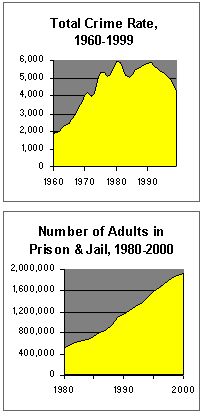Think of it. Two million prisoners eat six million meals a day. Here to help meet that need is Jim Carroll of Canteen Correctional Services. "We provide food services and commissary services to correctional facilities nationwide."
| | 
Crime soared in the 1970s and '80s but dropped off in the '90s. However since 1980 the prison and jail population has steadily grown. Source: Bureau of Justice Statistics |
Inmates get sick. Another corporation, the St. Louis-based Correctional Medical Services, is the leading provider of "comprehensive medical care in jails and prisons on a contract basis," explains company representative Jim Chaney.
Prisoners exercise and kill time in the game room. "We sell a lot of sporting games, board games, puzzles, table games to prison facilities," says Brian Wexler, Vice President of Sales and Marketing with Quality Table Games.
Some people point to all this money being made on prisons and wonder: Is the industry serving the needs of inmates, or is it the other way around?
Outside the convention center in Philadelphia, a few hundred people block traffic for a peaceful march through Center City. These protesters say a powerful web of private and public interests — the "prison-industrial complex" — perpetuates the war on crime for money.
"No more prisons! No more prisons!" they chant. A young woman shouts through a scratchy megaphone: "We are no longer asking. We are demanding! No more making money off of the flesh of other human beings!"
Some conventioneers with the Correctional Association seem bemused at the notion that they're causing people to get locked up.
"I think it's Halloween in Philadelphia, man," says conventioneer Ray Zaroufie as he waits to cross the street outside the convention center and watches chanting protesters dressed in striped inmate costumes.
Zaroufie works for a Tennessee-based company that supplies prison commissaries. "Do prisoners got to eat?" he asks. "Do they got to shave? I mean, somebody's got to sell that to the state to put in those jails and the prisons, right?"
Zaroufie has a point. Just because people make a profit from prisons, that doesn't mean there's a corrections lobby that works to drive up the inmate population. Certainly other forces have helped to do that. Crime soared in the 1970s and '80s. The news media devoted headlines and the tops of newscasts to the crack epidemic and gang warfare. Many Americans were alarmed. Politicians from both major parties seized the issue and held on tight. For two decades, a political consensus prevailed: the nation needed tougher sentences, more police, more prisons.
Sure, when it snowed prison-related contracts, businesses flocked to grab them. But do corporations also try to boost demand for their services? To some activists concerned about a prison-industrial complex, the American Legislative Exchange Council presents a striking case in point.
Next: Corporate-Sponsored Legislation

